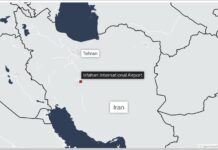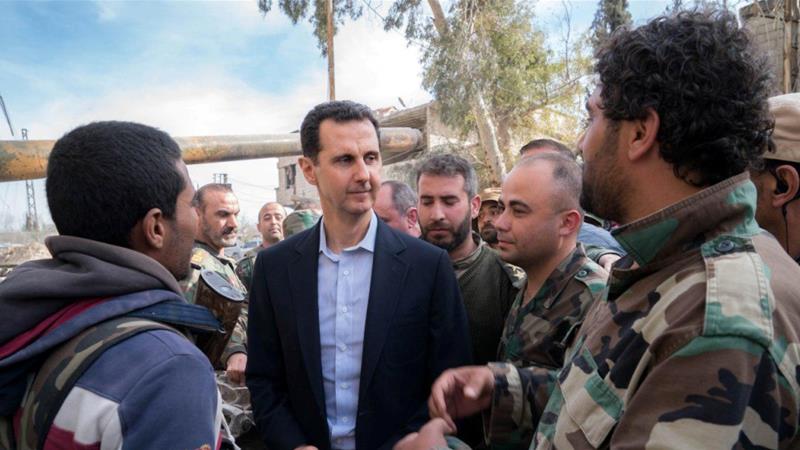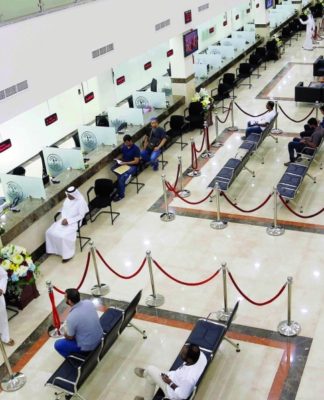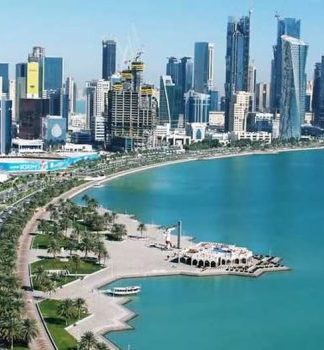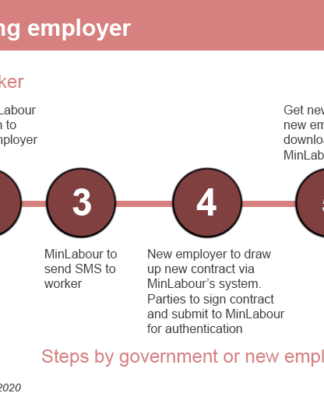The Syrian leader has survived seven years of conflict that has devastated much of the country he presides over.
![Why is Bashar al-Assad still in power? Assad has received military and diplomatic support of Iran and Russia [Reuters]](https://www.aljazeera.com/mritems/imagecache/mbdxxlarge/mritems/Images/2018/3/19/45f2fcd46e50478daa0dd109c0d5c738_18.jpg)
Syria’s President Bashar al-Assad has survived seven years of a devastating war and intense international pressure to step aside.
While Saturday’s US-led air strikes on Syrian government facilities will be a blow to his attempts to unify Syria under his rule, there’s been little suggestion that they are aimed at ending his presidency.
After rapid rebel gains in the early years of the uprising against his authoritarian rule, the possibility that he would join a growing list of deposed Arab rulers was real.
|
|
But today, it’s the rebels on the back foot, having lost key strongholds inside the Syrian capital, Damascus, and in the northern city of Aleppo.
Even senior diplomats from states opposed to his government, such as the British Foreign Minister Boris Johnson, have said Assad can continue runningfor Syria’s top office.
Here, Al Jazeera looks at some of the reasons why he has lasted so long:
1. Foreign backing
In the summer of 2012, it was the rebels who had the momentum. A bomb blast in central Damascus had killed senior Syrian officials including the country’s defence minister and Assad’s brother-in-law, Assef Shawkat.
The rebels thought victory was near.
“The Syrian army had all but collapsed,” the Free Syrian Army Commander, Bashar al-Zoubi, told Al Jazeera.
It was at around this time that Iran stepped up its intervention in the country, providing training, experienced commanders, and foot soldiers in the form of Shia militias.
Iranian media outlets put the number of fighters Tehran has provided to the Syrian government in the tens of thousands.
The Iranian-trained National Defence Forces militia had a peak strength of 90,000 fighters and is widely credited with turning the tide of the war.
|
|
For Iran, Assad is a crucial ally and pivotal to protecting its interests in the region.
But while Iran’s contribution has come largely in the form of boots on the ground, it is the Russians who have provided Assad with arguably his biggest boost.
Starting in September 2015, Moscow began air strikes against Syrian rebel targets.
Their aerial campaign helped force Syrian rebels to abandon their strongholds in Aleppo, as well as in Eastern Ghouta.
2. Rebel divisions
Assad has benefited from divisions within the rebel ranks, as the loosely aligned Free Syrian Army broke up into rival factions, and harder line groups took up the anti-government cause.
Opposition groups initially welcomed the support of the fledgling Islamic State of Iraq and the Levant group (ISIL, also known as ISIS), but soon found themselves fighting it, drawing resources and fighters away from the campaign against Assad.
ISIL won out against the rebels in key cities, such as Raqqa, and forced the opposition from vast tracts of the country.
While rebel groups did regain some territory from ISIL, former rebel territory was recaptured from the group by Kurdish fighters and the government forces.
ISIL was not the only thorn in the rebels’ side, today there are dozens of rebel factionswho are divided over regional affiliation, ethnic identity, political stance, and religious affiliation.
3. International stance
While Western countries and regional powers, such as Turkey and Saudi Arabia, have been vocal in their opposition to Assad, none have taken decisive action to remove the Syrian leader.
Despite rebel appeals, the US has avoided the kind of military intervention that it launched in Libya, which helped rebels there bring down long-time ruler Muammar Gaddafi.
|
|
While arms have come through to rebel groups, opposition leaders say they are insufficient to counter the threat of the Syrian government’s air power.
The US decision not to supply weapons capable of doing so is influenced by fears that they could fall into the hands of groups like ISIL and, then later, be used against Western interests.
As the war has dragged on, an increasing number of officials in the West have deprioritised the importance of removing Assad.
In March 2017, the US ambassador to the UN, Nikki Haley said that getting rid of Assad was no longer the main focus of US policy.
Two months earlier, the British Foreign Minister Boris Johnson said Assad could stay as part of a peace deal.
4. Internal support
Despite widespread opposition to his rule, Assad continues to maintain significant levels of support within Syria.
Such support extends beyond his own Alawite community, and also includes members of the Sunni community who have benefited financially during his rule and have little interest in changing the status quo.
SOURCE: AL JAZEERA NEWS





